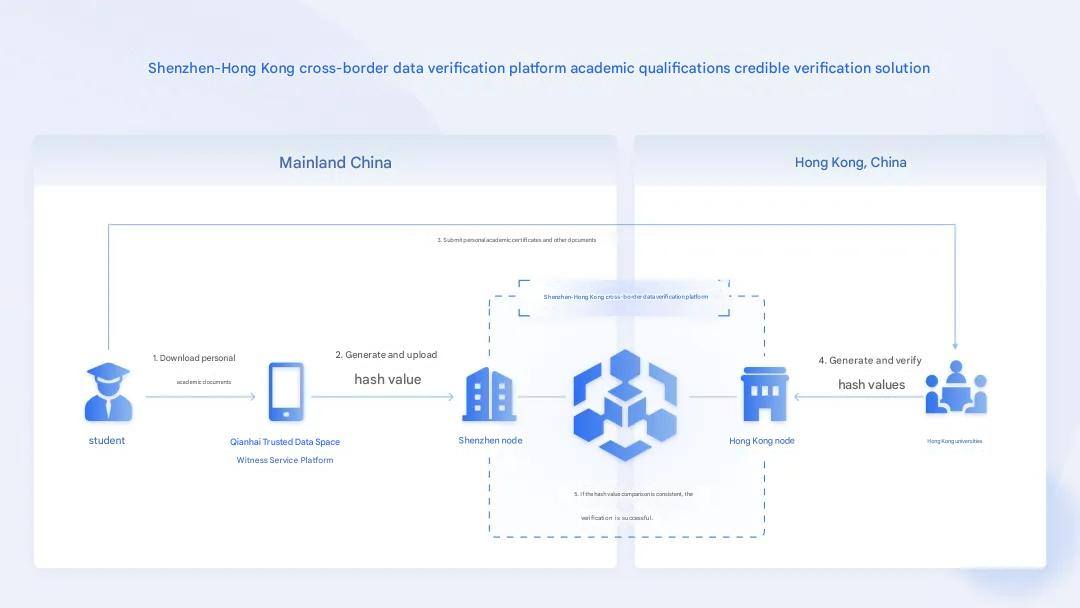【2025.02.24】Blockchain-Powered Data Validation Platform Enhances Cross-Boundary Academic Credential Verification
With the continuous development of the Greater Bay Area, data flow between Shenzhen and Hong Kong has become increasingly frequent. Recently, WeBank Technology Services, in collaboration with Hong Kong Certizen Technology, launched an innovative application in the education sector on the Shenzhen-Hong Kong cross-boundary data validation platform, supporting Hong Kong Polytechnic University (PolyU) in securely and efficiently verifying the educational information of mainland students. This application not only facilitates mainland students studying in Hong Kong but also helps Hong Kong universities optimize their admission review processes and strengthen academic integrity, further promoting the integration of the Greater Bay Area.
Blockchain-Powered Instant Verification Enhances Admission Review Efficiency
In recent years, the number of mainland students applying to Hong Kong universities has been on the rise. For graduate applications alone, Hong Kong universities receive tens of thousands of documents such as diplomas, degree certificates, and transcripts from mainland students each year. Manual verification is time-consuming and prone to errors. Online cross-boundary data transmission also faces challenges, including the high compliance threshold for sensitive personal data and the lack of necessary infrastructure. There is an urgent need for an innovative solution to efficiently verify educational information while complying with regulations in both regions.
In January 2025, WeBank Technology Services and Hong Kong Certizen Technology proposed an innovative solution for reliable academic credential verification on the Shenzhen-Hong Kong cross-boundary data validation platform. Mainland students can obtain their academic documents through a trusted data space built by the Authority of Qianhai Shenzhen. The platform generates a hash value (‘data fingerprint’) for the documents using cryptographic algorithms and records it on the blockchain to ensure data immutability.
After students submit their application materials on the university's official website, the university generates a set of ‘data fingerprint’ based on the same cryptographic algorithm. The university then compares the two sets of ‘data fingerprint’ on the cross-boundary data validation platform to verify the authenticity and consistency of the data. During the verification process, the platform does not access the original documents, but only compares the online ‘data fingerprint’ to quickly complete the reliable verification.

As the first university to utilize the platform, the person in charge of the PolyU’s Policy Research Centre for Innovation and Technology (PReCIT) predicted a trimmed verification cycle from eight hours to under two minutes per 100 applications while maintaining accuracy by combining this innovative solution with the Legal Entity Identifier (LEI) and its verifiable credential technology
The First Shenzhen-Hong Kong cross-boundary Data Infrastructure Expands to New Scenarios
The launch of the cross-boundary academic credential verification service marks a significant breakthrough of the Shenzhen-Hong Kong cross-boundary data validation platform in the education sector. The platform was jointly developed under the guidance and support of government departments from both regions. It is operated by China (Qianhai) Internet Exchange, Shenzhen Credit Service Co. Ltd, WeBank Technology Services. WeBank providing the overall solution design and technical support.
The platform is developed based on the Distributed Data Transmission Protocol (DDTP) concept proposed by WeBank and the open source blockchain platform FISCO BCOS it leads in developing. It uses the immutability and traceability of blockchain technology to achieve reliable verification of user-carried data through hash verification, meeting cross-boundary data regulatory requirements while safely and efficiently enabling cross-boundary data flow. Notably, the Distributed Data Transfer Protocol (DDTP) has successfully obtained approval for standardization from the IEEE Standards Association (IEEE SA). This positions DDTP to potentially become the first international standard in the field of trustworthy personal data portability. Notably, an international standard based on the DDTP has successfully obtained approval for initiation from the IEEE Standards Association (IEEE SA), and is poised to become the first international standard in the field of trusted personal data portability.
As the first digital cross-boundary infrastructure between the mainland and Hong Kong, the Shenzhen-Hong Kong cross-boundary data validation platform has connected eight scenario institutions and has been applied to scenarios such as SME financing, enterprise account opening, and cross-boundary tuition payment. It has not only provided convenience for residents and enterprises in both regions but also injected new energy into the deep integration and high-quality development of the Greater Bay Area's economy.


